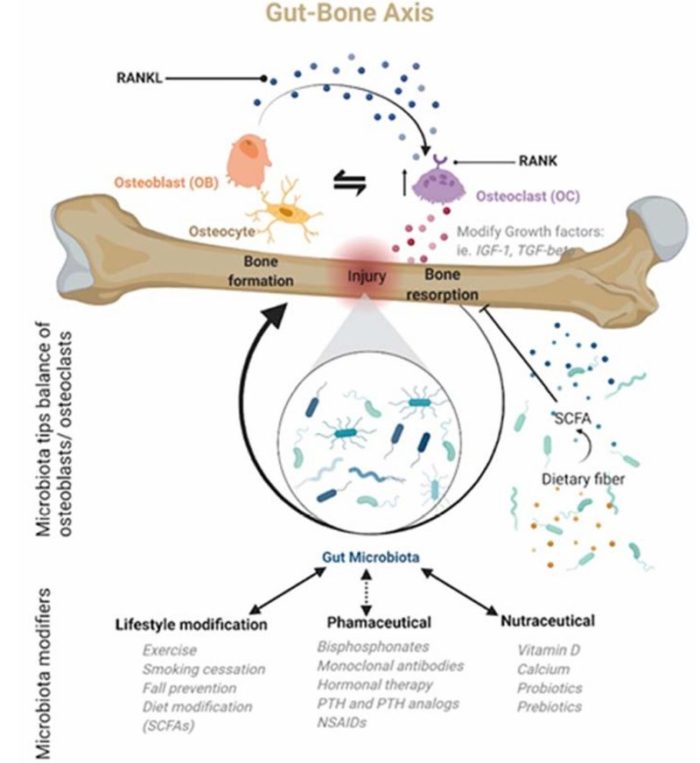How the state of your gut could contribute to sports injuries
Silvia Barbaresi, Co-founder and CSO at Minutia.AI discusses the role of the Gut-Bone Axis in injury prevention and its potential applications in sports.
Sports injuries are a detrimental cause of poor performance, decline and bad physical progression in athletes. Many injuries are related to overuse during intensive training, but indirect factors such as systemic inflammation may contribute to them. Gut health modulates immune systemic responses to inflammation and pain. Bone stress injuries in particular account for up to 20% of injuries in specific populations (as runners), negatively affecting athletes’ performance in time.
Bone tissue undergoes continuous renewal through bone remodelling, which is maintained by the equilibrium of osteoclast (OC)-mediated bone resorption and osteoblast (OB)-mediated bone formation. Gut microbiota affects bone health naturally through a variety of immune regulators, cytokines, miRNAs, hormones, and other small bioactive molecules, eliciting a profound impact on the growth, development, and function of the tissue.

Leaky gut syndrome is the condition where selective intestinal permeability is impaired, and positive and negative metabolites, bacteria, and toxins pass to the bloodstream, increasing systemic endotoxemia. Systemic endotoxemia is acondition where endotoxins, specifically lipopolysaccharides (LPS) from Gram-negative bacteria, enter the systemic circulation and trigger a systemic inflammatory response. These potent immunostimulants activate the innate immune system, leading to the production of pro-inflammatory cytokines, such as tumor necrosis factor-alpha (TNF-α), interleukin-1 beta (IL-1β), and interleukin-6 (IL-6). In these conditions, the immune response promotes a low-grade systemic inflammation that alters nociception and pain sensitivity, promoting soreness, lack of recovery, and local tissue inflammation.
Some publications have described a relationship between levels of specific gut bacteria and local inflammation, nociceptive effects, and pain. For example, increased levels of the Streptococcus species were associated with knee osteoarthritis (OA) pain (Romero et al, 2021) and depleted levels of the Coprococcus species were associated with widespread chronic pain (Freidin M, et al, 2021). Ruminococcus gnavus degrading the mucus, induced the translocation of LPS through the intestinal epithelium, promoting the leaky gut syndrome (Schroeder, B, 2019). Among other species, Klebsiella pneumonia can damage epithelial cells, leading to enhanced intestinal permeability and Porphyromonas gingivalis, a periodontopathic bacterium, may predispose hosts to systemic inflammation and higher risk of leaky gut syndrome (Kinashi, Y and Hose, K, 2021).
Indeed, there is a growing body of evidence that the optimisation of prebiotics, probiotics and dietary fibres has reproducible health benefits, with specifically lasting benefits on bone health. However, clinical recommendations for such nutraceuticals remain quite often general, not tailored to the patient’s needs. Precision nutrition not only should become a component of standard healthcare in injury management and recovery, but also a powerful tool for injury prevention, in athletes as well as in aging models of frail people.
Silvia Barbaresi
Silvia Barbaresi is a Biotechnologist by training (MSc-Rome, La Sapienza, Masters Human Nutrition and Metabolism (UB-Spain), PhD in the field of Sport Nutrition (Ghent University-Belgium / Aspire Academy, Doha, Qatar). She co- “Microbiota and Sport” for the Italian Clorofilla Editore (Microbioma.it) as well as several scientific publications in the microbiology field as well as sport nutrition and ergogenic supplements.
She is the Co-Founder and Chief Scientific Officer of a startup in the field of gut microbiota science applied to sports and longevity: Minutia.AI She is responsible for B2B services to integrate gut microbiota analysis in performance enhancing programmes for athletes, football players, or any other sport with the aim of allowing optimal recovery and maximal physical and mental performance in sport.

Contacts:
Email:
silvia.barbaresi@minutia.ai
Web: www.minutia.ai
Refs:
Freidin, M et al, An association between chronic widespread pain and the gut microbiome Rheumatology, August 2021 https://academic.oup.com/rheumatology/article/60/8/3727/6040753
Kinashi, Y and Hose, K, Partners in Leaky Gut Syndrome: Intestinal Dysbiosis and Autoimmunity, Frontiers in Immunology, April 2021 https://www.frontiersin.org/journals/immunology/articles/10.3389/fimmu.2021.673708/full
Romero E, et al Relationship between the Gut Microbiome and Osteoarthritis Pain: Review of the Literature, Nutrients, Feb 2021, https://www.mdpi.com/2072-6643/13/3/716
Shroeder, B, Fight them or feed them: how the intestinal mucus layer manages the gut microbiota, Gastroenterology Report, Feb 2019 https://academic.oup.com/gastro/article/7/1/3/5305718